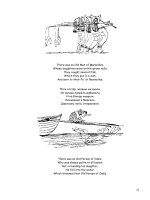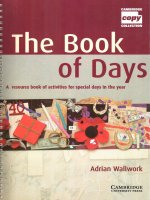The student and the book
Bạn đang xem bản rút gọn của tài liệu. Xem và tải ngay bản đầy đủ của tài liệu tại đây (85.44 KB, 16 trang )
chapter 1
The student and the book
I loitered away my boyhood in books, and dissipated my youth
in reverie . . .
``Berenice''
Ellis and Allan, a Richmond, Virginia, import/export ®rm estab-
lished by Charles Ellis and John Allan in 1800, became pro®table
enough during the following decade and a half for the partners to
decide to open a London of®ce after the War of 1812 had ended. In
1815, John Allan left Richmond for London, taking with him his
family: his wife Frances; her unmarried sister, Ann ``Nancy'' Valen-
tine, who had long been a member of their household; and Edgar
Poe, the young boy John and Frances had unof®cially adopted some
years before. After spending time in Scotland, they reached London
in the ®rst week in October. By month's end, they had found
lodgings in Bloomsbury. Allan wrote home to his business partner,
describing his family and their cozy accommodations, depicting
himself seated ``by a snug ®re in a nice little sitting parlour in No. 47
Southampton Row, Russel[l] Square where I have procured Lod-
gings for the present with Frances and Nancy Sewing and Edgar
reading a little Story Book.''
1
That young Poe was busy reading is unstartling. John Allan had
already recognized the child's precocity and purchased some books
for him before they left the United States.
2
ThebooksAllanhad
purchased, schooltexts by the English grammarian Lindley Murray,
may have been useful for Poe's education, yet they would hardly
have appealed to him as much as the day's storybooks. Allan
obviously acquired additional volumes for the boy during their ®rst
months in Great Britain. The storybook young Poe was reading in
late October could have been any one of several recently published
chapbooks. He later expressed his familiarity with Sinbad the Sailor
1
and Jack and the Beanstalk; new London editions of these two works
appeared the year the Allan family came to England.
3
So did new
editions of The History of Little King Pippin and Tom Thumb.(Inoneof
his lectures, Poe would praise a ``penny edition of Tom Thumb.''
4
)
Mother Goose's Melody, a work Poe would mention in ``The Literary
Life of Thingum Bob,'' appeared in a London edition the following
year.
5
Thomas Love Peacock's Sir Hornbook, or, Child Launcelot's Expedi-
tions: A Grammatico-Allegorical Ballad, which went through two editions
in 1815, combined grammar and adventure to create a work with
greater appeal for a six-year-old than Murray's Grammar.Asthe
poem begins, Childe Launcelot approaches the castle of Sir Horn-
book who joins the young knight and leads him on a series of
adventures, encountering such valiant knights and ladies fair as Sir
Syntax and his love, Lady Prosody, and culminating at the Muses'
gates where Sir Hornbook leaves the youthful knight:
Childe Launcelot pressed the sacred ground,
With hope's exulting glow;
Some future song perchance may sound
The wondrous things which there he found,
If you the same would know.
6
James Pedder's The Yellow Shoe-Strings, or, The Good Effects of
Obedience to Parents had appeared in 1814 and had quickly become a
popular book among English children or, more precisely, a popular
book for British parents to give to their children. Reviewing one of
Pedder's subsequent works, Poe wrote that the author was ``well
known in England, as the composer of one of the most popular
juvenile books of the day, `The Yellow Shoe-strings' ± three words
familiar in nursery annals. To indite a really good work of this kind
is a task often attempted in vain by men of high literary eminence. In
truth the quali®cations for success depend not a little upon a clear
head, but still more upon a warm heart.''
7
The work's didactic
sentimentalism has doomed it to obscurity since, yet Poe remem-
bered The Yellow Shoe-Strings with fondness. His kind words, however,
may have been personally motivated. During the 1830s, Pedder
moved his family from England to Philadelphia, and Poe developed
a close friendship with him and his daughters, Anna and Bessie, who
occasionally aided the impoverished Poe family and to whom he
inscribed a copy of Tales of the Grotesque and Arabesque in 1839.
8
Some literary classics of the previous century were available in
2 Poe and the printed word
highly abridged versions designed for young readers and illustrated
with woodcuts. In 1815, chapbook editions of Daniel Defoe's Moll
Flanders and Robinson Crusoe were published in London, as they had
been for many years. Poe later read an unabridged Robinson Crusoe,
but his ®rst exposure to the work likely came through one of the
many chapbook versions. Though John Allan was not much of a
literary man, his family would have kept a copy of Robinson Crusoe.
About the book, Poe later remarked, ``It has become a household
thing in nearly every family in Christendom.''
9
Writing in the
editorial ®rst person plural, Poe recalled his childhood memories of
the book with great affection: ``How fondly do we recur, in memory,
to those enchanted days of our boyhood when we ®rst learned to
grow serious over Robinson Crusoe! ± when we ®rst found the spirit
of wild adventure enkindling within us, as, by the dim ®re light, we
labored out, line by line, the marvellous import of those pages, and
hung breathless and trembling with eagerness over their absorbing ±
over their enchanting interest!''
10
Robinson Crusoe fostered Poe's
interest in imaginary voyages, an interest other contemporary publi-
cations would have perpetuated. The following year, The Surprising
Adventures of Baron Munchausen, a highly abridged version of
Munchausen's Travels, appeared as part of the ``New Juvenile
Library.''
During the spring of 1816, Poe entered the London boarding
school of the Misses Dubourg. If he had yet to devote much time to
Lindley Murray's textbooks, the school would have given him the
opportunity. Murray's English Spelling-Book; With Reading Lessons
Adapted to the Capacities of Children supplemented his education, but it
was not the main spelling book the Misses Dubourg used, for John
Allan had to purchase a copy of William Fordyce Mavor's The English
Spelling Book, Accompanied by a Progressive Series of Easy and Familiar
Lessons after Edgar had entered the school. Murray's The English
Reader: Or, Pieces in Prose and Poetry, Selected from the Best Writers,awork
that had gone through numerous editions since its original publi-
cation in 1799, introduced Poe to many British belletristic writers.
The work was broken down into two parts, prose and verse, and
each part was subdivided into separate chapters devoted to different
types of writing ± narrative, didactic, argumentative, descriptive.
The prose section of the book contained quotations from Joseph
Addison, Hugh Blair, Oliver Goldsmith, David Hume, and Samuel
Johnson, among many others. The poetry section provided generous
The student and the book 3
excerpts from the work of Mark Akenside, William Cowper, John
Milton, Alexander Pope, James Thomson, and Edward Young.
While there is no way to know precisely how much attention Poe
gave these textbooks during his early years in England, his later
writings reveal his familiarity with Murray's works, which would
become a kind of touchstone in Poe's criticism. The English Grammar,
Murray's most well-known schooltext, ®gures prominently in his
review of Theodore S. Fay's Norman Leslie.Inthereview,Poe
quibbled with Fay's and, indirectly, with Nathaniel P. Willis's
grammar: ``As regards Mr. Fay's style, it is unworthy of a school-boy.
The `Editor of the New York Mirror' has either never seen an
edition of Murray's Grammar, or he has been a-Willising so long as
to have forgotten his vernacular language.'' Poe pointed out several
grammatical errors and concluded: ``There is not a single page of
Norman Leslie in which even a schoolboy would fail to detect at
least two or three gross errors in Grammar, and some two or three
most egregious sins against common-sense.''
11
Another amusing
reference to Murray came in a footnote to a poem of Murray's
reprinted in the Southern Literary Messenger. Poe called Murray ``that
celebrated grammarian'' but ended his footnote with the comment,
``It is somewhat remarkable that the present lines involve an odd
grammatical error of construction in the concluding stanza.''
12
The ease and con®dence with which Poe noticed grammatical
errors in others' works suggests that he paid close attention to his
early schoolbooks. Reviewing Hugh A. Pue's Grammar of the English
Language, in a Series of Letters, Addressed to Every American Youth,Poe
found numerous grammatical errors and concluded that ``whether
Mr. P.'s queer little book shall or shall not meet the views of `Every
American Youth,' will depend pretty much upon another question of
high moment ± whether `Every American Youth' be or be not as
great a nincompoop as Mr. Pue.''
13
While a good grammarian, Poe
nevertheless bristled at the kind of regimentation grammatical rules
imposed. In his ``Fifty Suggestions,'' written near the end of his life,
he wrote, ``Let the noblest poet add to his other excellences ± if he
dares ± that of faultless versi®cation and scrupulous attention to
grammar. He is damned at once. His rivals have it in their power to
discourse of `A. the true poet, and B. the versi®er and disciple of
Lindley Murray.' ''
14
Young Poe was introduced to the fundamentals of the Anglican
Church at the Dubourg school, too. A Book of Common Prayer and a
4 Poe and the printed word
copy of John Lewis's The Church Catechism Explained by Way of Question
and Answer, a work which had been in use for over a century, were
among other expenses John Allan paid to the Dubourgs at the
time.
15
Beyond its religious value, the Book of Common Prayer would
have impressed Poe with the elegance of the English language. Most
of the selections in Murray's English Reader came from the Augustan
Age, but the prose of the Anglican prayer book, with its formal
diction and long periods, hearkened back to the Elizabethan.
Poe also studied history and geography with the Dubourgs. He
learned geography reading Nicolas Lenglet Dufresnoy's Geography for
Children: Or A Short and Easy Method of Teaching and Learning Geography,a
text in use since the 1730s, and he studied history with Christopher
Irving's A Catechism of the History of England. Back in the United States,
schoolchildren Poe's age were reading native history and geography
texts written from highly nationalistic points of view. Unlike so many
other Americans who grew up during and just after the War of 1812,
Poe expressed little political animosity toward Great Britain. Far
from it. His critical writings sometimes encouraged rapprochement
between the two countries. Reviewing John Armstrong's Notices of the
War of 1812, he wrote, ``We are grieved . . . to see, even in the
opening passages of the work, a piquancy and freedom of expression,
in regard to the unhappy sources of animosity between America and
the parent land, which can neither to-day nor hereafter answer any
possible good end, and may prove an individual grain in a future
mountain of mischief.''
16
The dearth of American themes and
characters in Poe's writings, aspects that have helped his works rise
above the jingoistic breast-beating of his contemporaries, can be
attributed partially to the cosmopolitan education he received from
the Misses Dubourg.
Sometime in late 1817 or early 1818, Poe left the Dubourg school
and began attending the Manor House School, Stoke Newington,
about four miles from London. The school and its overseer, the
Reverend John Bransby, would receive ®ctional treatment in Poe's
``William Wilson.'' Most of the schoolbooks were the common
property of the Manor House School and passed from one student to
the next ± if Poe's description in ``William Wilson'' can be believed:
``Interspersed about the room, crossing and recrossing in endless
irregularity, were innumerable benches and desks, black, ancient,
and time-worn, piled desperately with much-bethumbed books.''
17
Here, if not before, Poe began learning Latin. On 22 June, 1818,
The student and the book 5
John Allan wrote to a correspondent, ``Edgar is a ®ne Boy and reads
Latin pretty sharply.''
18
A good Latin education begins with Aesop's
Fables,andacopyofAesopi Fabulae formerly in Poe's possession
survived into the twentieth century.
19
The Reverend Bransby also
exposed his students to British belles lettres and Latin verse. Another
pupil remembered him as a ``thorough scholar'' who was ``very apt
at quotation, especially from Shakespeare and Horace.''
20
Poe also
continued his study of English history with John Bigland's Letters on
English History, for the Use of Schools and may have read Bigland's other
textbooks treating geography, European history, and natural
history.
21
John Allan was proud of his young foster son's scholarly prowess
and often wrote to his uncle William Galt from London to tell him
so. In three letters written during a four-month period which
included Poe's eleventh birthday, Allan wrote that Edgar ``enjoys a
good reputation and is both able and willing to receive instruction'';
``is a verry ®ne Boy and a good Scholar''; and ``by his own exertions
he has repaired many Gaps [in his education] both in general
literature and the Sciences.''
22
The books young Poe read at Stoke
Newington would prepare him for the ®ne classical education he
would receive upon his return to Virginia.
The London of®ce of Allan and Ellis ( John Allan had transposed the
names in England) proved unsuccessful, so the Allan family returned
to Richmond in the summer of 1820. Later that year, Poe began
studying with Joseph H. Clarke, a schoolmaster who had recently
relocated from Baltimore. In the advertisements for his Richmond
school, Clarke stated that he taught the classical languages, writing,
arithmetic, bookkeeping, geometry, trigonometry, navigation, sur-
veying, gunnery, optics, astronomy, conic sections, algebra, me-
chanics, and geography, among many other subjects. Though the list
seems hyperbolic, other evidence veri®es that he provided his
students with a broad education. Clarke, who lived into his tenth
decade, recalled Poe reading ``Ovid, Caesar, Virgil, Cicero, and
Horace in Latin, and Xenophon and Homer in Greek.''
23
Though
supplying several names, this recollection actually reveals little, for
the works of these authors formed the core of any good classical
education. John Allan's account books show that he paid Clarke for
acopyofDe of®ciis, Cicero's ethical treatise written as advice to a
son, and an expensive edition of Horace's works.
24
Besides De of®ciis,
6 Poe and the printed word









